RIP Happy Warrior of Canadian politics — who spoke with a broader voice that needs to be louder in the 2020s.
Aug 12th, 2023 | By Randall White | Category: In BriefRANDALL WHITE. FERNWOOD PARK, TORONTO. SATURDAY, AUGUST 12, 2023. I did not know Hugh Segal personally. I never met him face to face. The closest I came was when my real-world acquaintances among Ontario bureaucrats urged that some document under discussion betrayed the Hugh Segal touch.
I have, on the other hand, read and even been slightly involved in the fate of a number of government documents that betrayed the Hugh Segal touch. At this point in his Ontario career he was an unusually young Secretary of the Policy and Priorities Board of Cabinet. (Born in October 1950 in Montreal, he first appears in this role in my collection of Ontario government phone books in March 1979.)
I could ruin more of an agreeable summer afternoon tracing Mr. Segal’s subsequent career in my Ontario government phone book collection — an artifact of a now much reduced age of “Paper and the Printing Press.” (And yet, if you already have many such now near-obsolete printed paper collections yourself, the temptation to use them remains vast.)
The long and short is that I did at least bump into what might be called Mr. Segal’s policy process handiwork from time to time — while working for the Ontario government myself. Like others I came to admire the high-minded and authentically “progressive conservative” (or even “Red Tory”) tilt that Hugh Segal brought to public policy debate. (Without making any ideological or other big deal of it!)
With Bill Davis, Brian Mulroney … and finally Paul Martin
Hugh Segal’s forward-looking conservative approach, which for a time (1979–1982?) had seemed to work well for Premier William Davis, may have started to wear somewhat thin, in the new more right-wing currents that would finally see Frank Miller succeed Davis as premier (and then effectively lose the 1985 Ontario election to David Peterson and Bob Rae).
Meanwhile, whatever his narrow political vicissitudes, Mr. Segal’s distinctive voice remained a welcome addition to many channels of the wider public conversation in Canada. And that’s where I like many other non-conservatives continued to follow his post-Ontario-government career with some interest — all the way to his latest wise enthusiasm for some form of publicly-funded basic income in the turbulent new technological era ahead .
I don’t really know, but my instinctive impression is that most deadly serious (and especially right-wing) conservative political operators tended to view Hugh Segal as something of an idealist, not quite in step with the hardball real world of democratic politics.
After his comparatively short time at the top in Ontario, about a decade later he was given a perhaps doomed-to-fail 1992–93 shot at rescuing the Mulroney Conservative government in Ottawa. But it finally seemed logical that it was Liberal PM Paul Martin who another decade or so later again, in the summer of 2005, appointed Hugh Segal to the Senate of Canada (an unusually wise appointment to this still seriously unreformed “relic of the 19th century” [Stephen Harper] in Canada today, on any or all of several different grounds).
Master of Massey College and role in early 1980s constitutional debate
It almost certainly says something about Hugh Segal’s ultimate political realism on the still unreformed Senate of Canada that he resigned from that “unique institution” (Harold Innis) in 2014, “twelve years before he would reach the mandatory retirement age of 75, to accept an academic appointment as Master of Massey College in Toronto.” It may also say something about the sad news on August 9, 2023 that Master Segal finally “retired from the Massey College position effective June 30, 2019, five years into his seven-year term.”
Whatever else, Hugh Segal had a genuinely illustrious career as what cp24 TV news text and other MSM are calling a noted Canadian “politico.” Before endorsing an apt capsule comment on this career from someone who really did know Mr. Segal up close, I want to just finally note his still very “youthful” and no doubt minor but intriguing role in what finally became Canada’s Constitution Act, 1982 (which begins with the Canadian Charter of Rights and Freedoms). I would submit two pieces of evidence :
(1) A photo posted on “Alberta Politics.ca by David Climenhaga” with this caption : “Constitutional ‘architects’ Roy McMurtry, Jean Chrétien and Roy Romanow in 1981, with a youthful Hugh Segal, in glasses, then an aide to Ontario Premier Bill Davis (Photo: Mr. Segal via Policy Options).” [And see Mr. Climenhaga‘s comment below for further intelligence on the deeper provenance of the photo!]
(2) Mr. Segal’s last appearance in my now sometimes deteriorating and less than comprehensive paper collection of (to give its proper cover title) the Government of Ontario Telephone Directory was as “Associate Secretary of Cabinet for Federal Provincial Relations” in the Spring 1982 edition. (The next volume in my imperfect collection, I should stress, is Summer 1983 — and by this point I was not regularly employed by the Ontario government myself.)
Hugh Segal and the Ford government’s Greenbelt hi-jinks
I’d at least begin to conclude by noting and endorsing counterweights’ retweet of a tweet from Graham Fox at Navigator, shortly after Hugh Segals’s sad passing “surrounded by family” in Kingston, ON, August 9, 2023. As Mr. Fox put it quite succinctly : “Cdn politics has lost its happiest warrior tonight. Hugh Segal’s lifelong call for decency in our politics is at once a look back at what was, and a hope for what can be.”
At the risk of saying a few not-quite-the-right things (at this point in time), it seems somehow fitting and/or even important and realistic — as well as humourous in some characteristically Segalesque way — to ultimately note that Hugh Segal passed away on the same day that Ontario Auditor General Bonnie Lysak released a critical report on the Ford government’s controversial Greenbelt land dealings in Canada’s most populous province.
The report generated such headlines as: “Ontario Greenbelt development plans were ‘biased’: AG report” ; “Ontario government’s Greenbelt land swap influenced by well-connected developers, AG finds … Developers could see an $8B increase to value of land now open for housing development, report finds” ; “Developers had direct influence over Ontario Greenbelt land removal, AG finds” ; “Ford’s Greenbelt plan favoured certain developers, Ontario’s Auditor-General report says.”
Finally David Moscrop has argued on the TVOntario website that : “The Greenbelt report proves it: The Ford government is corrupt … OPINION: After the auditor general’s explosive Greenbelt report, resignations and further investigations are the only way to restore some sense of integrity.”
A broader voice that needs to be louder among us in the 2020s.
Bonnie Lysak will be at the end of her term as Ontario Auditor General in early September, and she does have her own story. (For one thing she was often no more popular with Liberal Premier Wynne than she has been with Conservative Premier Ford — who has nonetheless claimed he will implement 14 of her 15 Greenbelt recommendations.)
The evolution of the office of Auditor General in Ontario (formerly Provincial Auditor, as established in 1869) is also an intriguing story of just how much executive dominance there used to be in the long history of Ontario government and politics.
I can report myself as well that even during the William Davis (and Hugh Segal) progressive conservative heyday, the Conservative government at Queen’s Park was always congenitally friendly to real estate developers. But the Davis government also stopped the Spadina Expressway in Ontario’s capital city. A former reforming education minister, Premier Bill Davis from Brampton was a friend to the Ontario school system of his day, across the province.
Doug Ford and others (M. Poilievre eg) have understandably enough tried to show some friendship for Hugh Segal in their comments on his sad passing. And that must make his ghost smile in the usual Segalian way. As he was at pains to make clear to the wider public, hard right-wing conservatives really had very little use for his type of conservative, from the Reagan-and-Thatcher 1980s on.
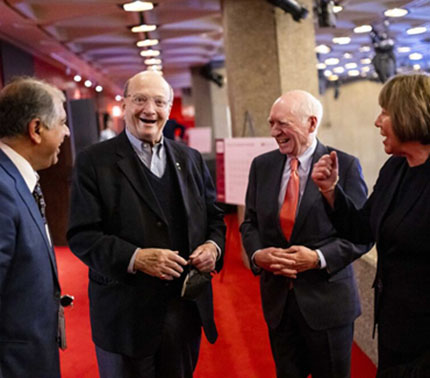
In Ontario Mr. Segal’s support for the basic income concept in the 21st century obviously enough had more in common with Liberal Premier Kathleen Wynne than with Conservative Premier Ford — whose government stopped the Wynne government’s basic income pilot project, in which Mr, Segal had an initial helping hand. (And Bill Davis could reasonably be said to have more in common with Ms Wynne much more generally as well.)
The kinds of mistakes the Ford government is now slyly (if all too smartly) confessing to in its too hasty Greenbelt land swaps are also no doubt not the kinds of things that legendary Canadian politico Hugh Segal would want to have anything to do with. Government and politics in the federal and provincial parliamentary democracies of Canada today is finally a more serious, honourable, and decent business than that (as well as intermittently entertaining and even humourous — “laughing to keep from crying” etc)! This is what Hugh Segal finally stood for so impressively. And he spoke with a broader voice that needs to be louder among us in the 2020s.
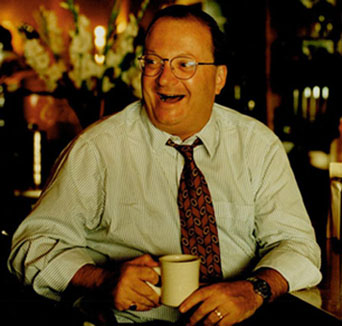
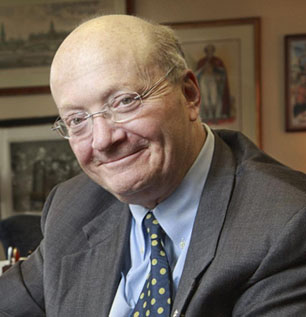

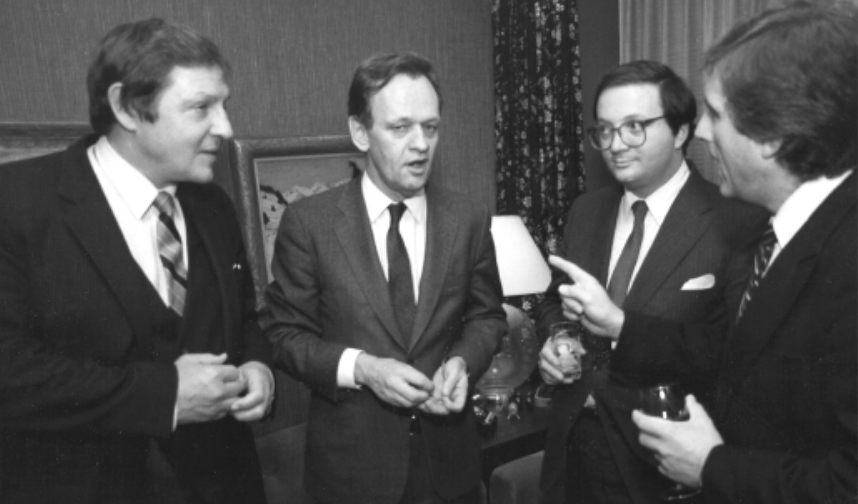

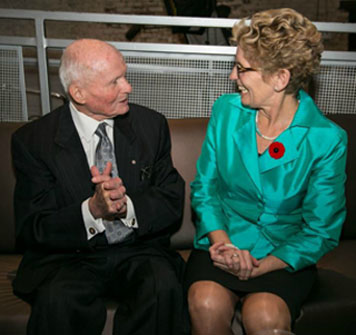


Mr. White: Thanks for the shout out. I found that photo a long time ago, but I ran it through Google Image Search just now and it came up attached to a publication of the Institute for Research on Public Policy, which you also mentioned, with the same credit line. It is found here: https://policyoptions.irpp.org/wp-content/uploads/sites/2/assets/po/who-decides-the-courts-or-parliament/fraser.pdf